外研版(2019)选择性必修 第二册Unit 5 A delicate world Vocabulary & Starting out课件(共24张PPT)
文档属性
| 名称 | 外研版(2019)选择性必修 第二册Unit 5 A delicate world Vocabulary & Starting out课件(共24张PPT) |  | |
| 格式 | pptx | ||
| 文件大小 | 72.2MB | ||
| 资源类型 | 教案 | ||
| 版本资源 | 外研版(2019) | ||
| 科目 | 英语 | ||
| 更新时间 | 2024-04-29 15:09:17 | ||
图片预览

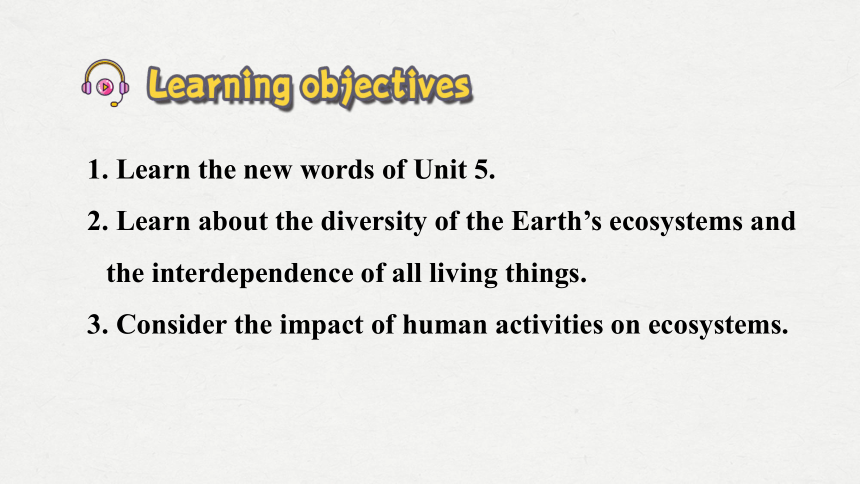
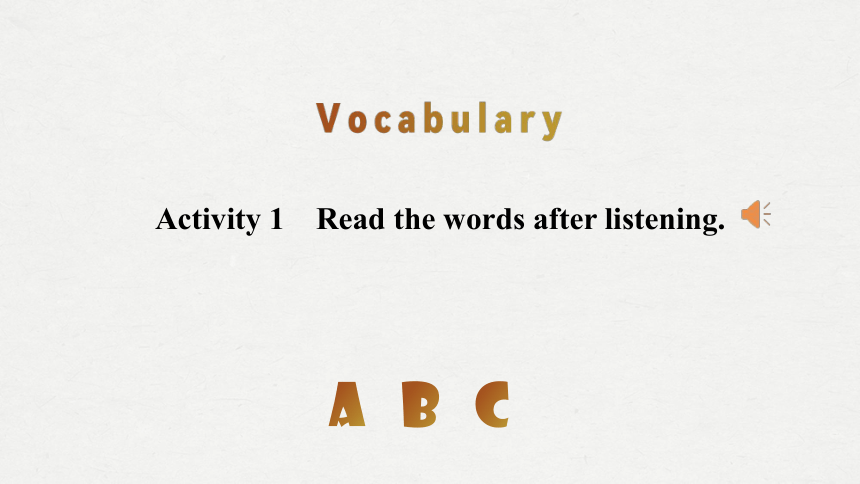
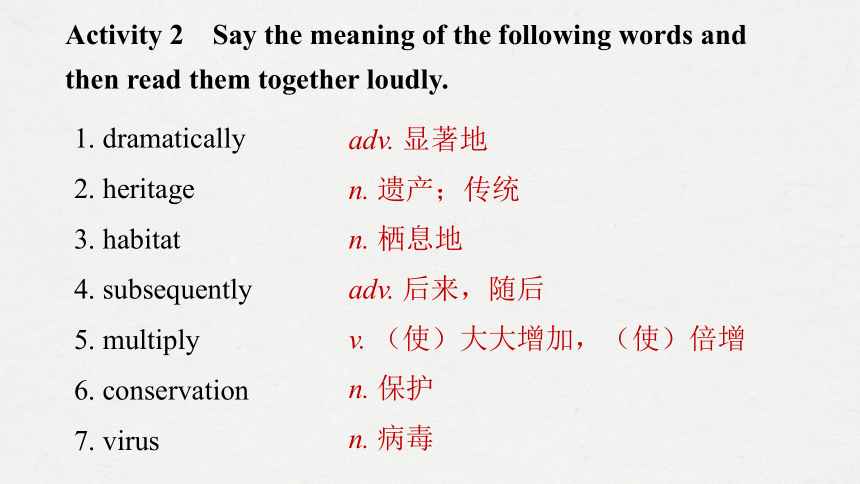
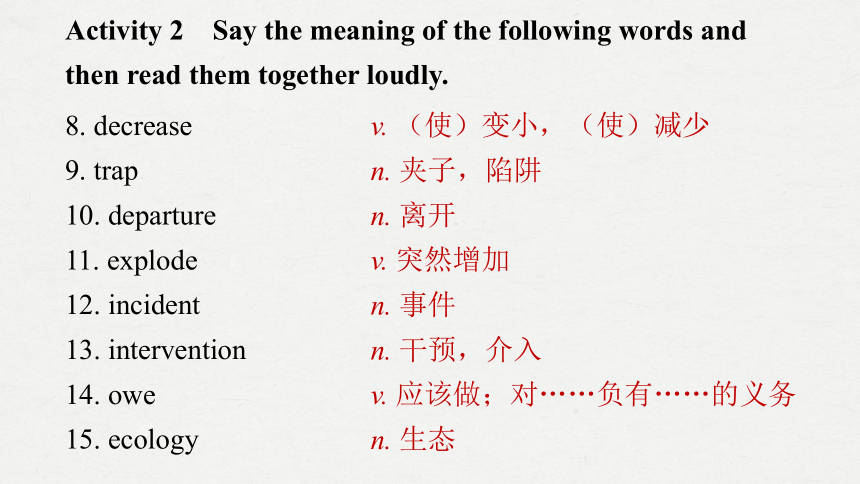
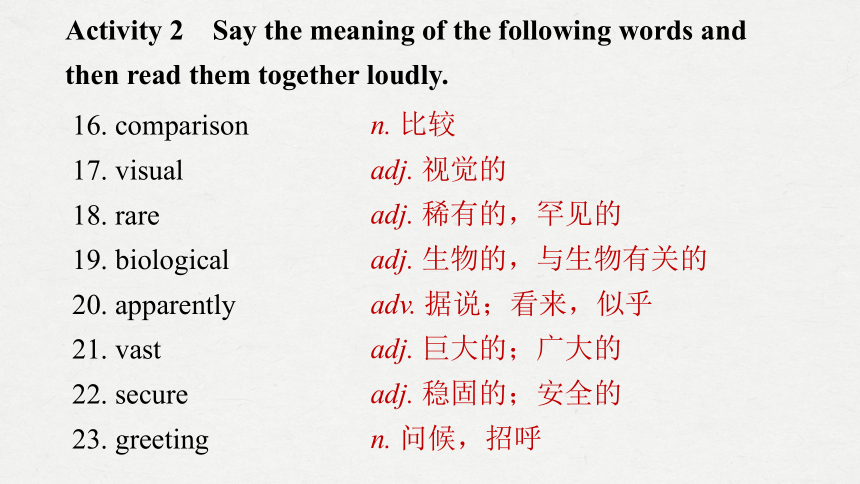
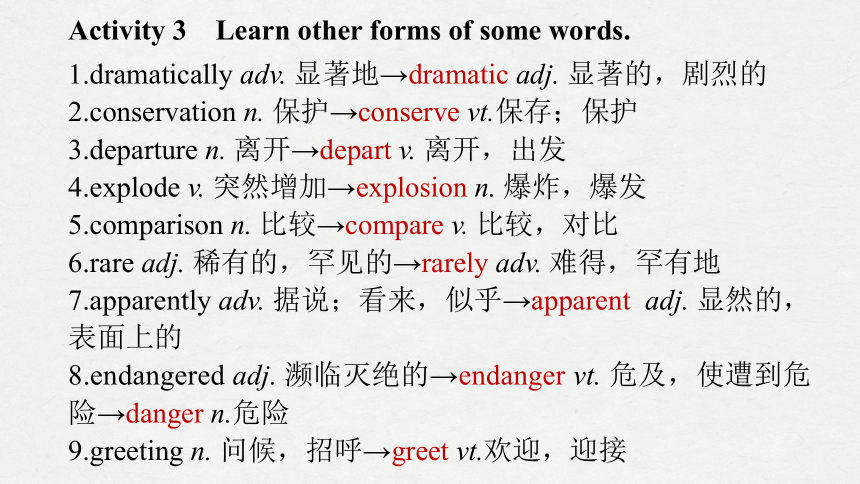
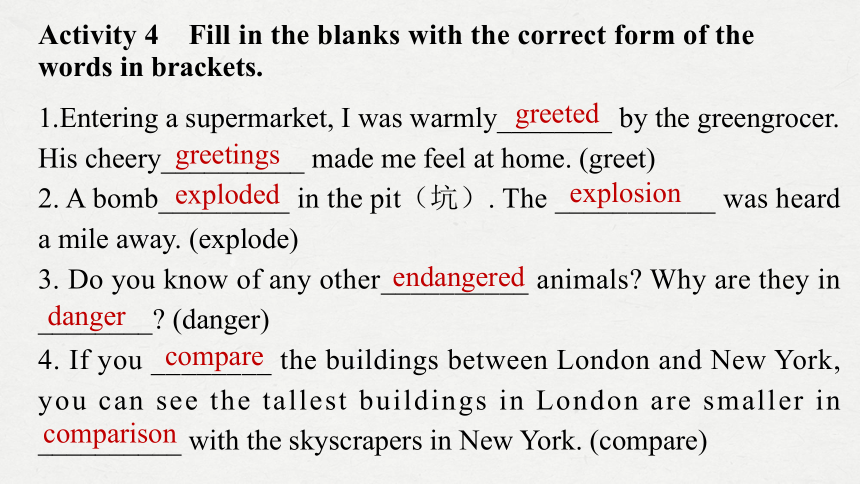
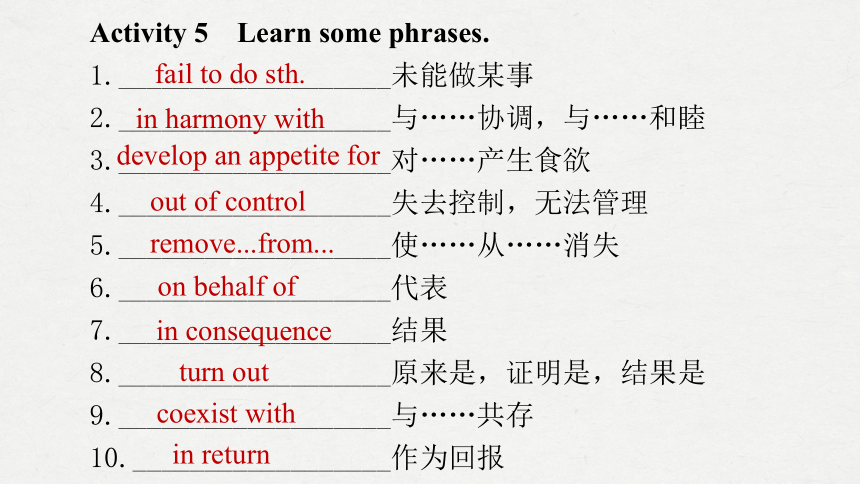
文档简介
(共24张PPT)
Vocabulary & Starting out
1. Learn the new words of Unit 5.
2. Learn about the diversity of the Earth’s ecosystems and the interdependence of all living things.
3. Consider the impact of human activities on ecosystems.
Activity 1 Read the words after listening.
1. dramatically
2. heritage
3. habitat
4. subsequently
5. multiply
6. conservation
7. virus
adv. 显著地
n. 遗产;传统
n. 栖息地
adv. 后来,随后
v. (使)大大增加,(使)倍增
n. 保护
n. 病毒
Activity 2 Say the meaning of the following words and then read them together loudly.
8. decrease
9. trap
10. departure
11. explode
12. incident
13. intervention
14. owe
15. ecology
v. (使)变小,(使)减少
n. 夹子,陷阱
n. 离开
v. 突然增加
n. 事件
n. 干预,介入
v. 应该做;对……负有……的义务
n. 生态
Activity 2 Say the meaning of the following words and then read them together loudly.
parison
17. visual
18. rare
19. biological
20. apparently
21. vast
22. secure
23. greeting
n. 比较
adj. 视觉的
adj. 稀有的,罕见的
adj. 生物的,与生物有关的
adv. 据说;看来,似乎
adj. 巨大的;广大的
adj. 稳固的;安全的
n. 问候,招呼
Activity 2 Say the meaning of the following words and then read them together loudly.
1.dramatically adv. 显著地→dramatic adj. 显著的,剧烈的
2.conservation n. 保护→conserve vt.保存;保护
3.departure n. 离开→depart v. 离开,出发
4.explode v. 突然增加→explosion n. 爆炸,爆发
5.comparison n. 比较→compare v. 比较,对比
6.rare adj. 稀有的,罕见的→rarely adv. 难得,罕有地
7.apparently adv. 据说;看来,似乎→apparent adj. 显然的,表面上的
8.endangered adj. 濒临灭绝的→endanger vt. 危及,使遭到危险→danger n.危险
9.greeting n. 问候,招呼→greet vt.欢迎,迎接
Activity 3 Learn other forms of some words.
1.Entering a supermarket, I was warmly________ by the greengrocer. His cheery__________ made me feel at home. (greet)
2. A bomb_________ in the pit(坑). The ___________ was heard a mile away. (explode)
3. Do you know of any other__________ animals Why are they in ________ (danger)
4. If you ________ the buildings between London and New York, you can see the tallest buildings in London are smaller in __________ with the skyscrapers in New York. (compare)
greeted
greetings
exploded
explosion
endangered
danger
compare
comparison
Activity 4 Fill in the blanks with the correct form of the words in brackets.
1.___________________未能做某事
2.___________________与……协调,与……和睦
3.___________________对……产生食欲
4.___________________失去控制,无法管理
5.___________________使……从……消失
6.___________________代表
7.___________________结果
8.___________________原来是,证明是,结果是
9.___________________与……共存
10.__________________作为回报
fail to do sth.
in harmony with
develop an appetite for
out of control
remove...from...
on behalf of
in consequence
turn out
coexist with
in return
Activity 5 Learn some phrases.
1.A truck went ________________ and crashed into the back of a bus.
2.The competition ____________ to be a great success.
3.I was lucky enough to speak at the opening ceremony ___________our class.
4. Human life is regarded as part of nature and the only way for us to survive is to live _________________ nature.
out of control
on behalf of
in harmony with
turned out
Activity 6 Fill in the blanks with the phrases above.
Before you watch
What is happening in the pictures
Activity 1: Watch the video and answer the questions.
While you watch
1. Are humans part of Earth’s ecosystems Why
Yes. Humans are part of Earth’s ecosystems. Because all the living things live in ecosystems and people are living things.
1. Are humans part of Earth’s ecosystems Why
2. Describe the wooden puzzle game.
The whole thing represents an ___________. The woods stand for ________, including _______ who fit all together and ___________ each other to live. If a species go ______,it will disappear from the ecosystem. Losing few of them ______ cause too much trouble.
But losing too many will make the __________ rickety(摇晃的).Humans have to manage the ecosystem extremely _________. If not, it will _____ and there won’t be any place for human beings.
ecosystem
species
humans
extinct
will not
depend on
2. Describe the wooden puzzle game.
ecosystem
carefully
fall
Activity 2: Watch and think.
In what ways can humans affect ecosystems
Humans can affect ecosystems in __________________ ways. For example, to have a positive influence on ecosystems, people can _____________________________
____________ etc. However,_________________________ _________________________ affect ecosystems in a negative way.
positive and negative
plant trees, feed and protect animals,
deforestation, air and water
recycle things,
In what ways can humans affect ecosystems
pollution and excessive waste
Satellite Images of Aral Sea, Central Asia
1.What is happening to the area according to the satellite images
Aral Sea is becoming ______ and ______.
smaller
smaller
After you watch
Task 1 Look and Answer
2. What do you think a later satellite image would show
3.What do you think caused these changes
Connected Together
Between where I am standing and wherever you are sitting, there are millions of different 1._____(type) of plants and animals, millions of different species, all living together in the environment, in something we call an ecosystem. Now in order for an ecosystem to be successful, in order for it to be healthy, it has to have different kinds of plants and animals—lots of different kinds of plants and animals...something we call “biodiversity”. Now biodiversity sounds kind of complicated. But if you listen, it also 2._______(sound) kind of nice.
This is the Earth, our world. All the living things that we know of live here, and they live in ecosystems, places like tundras, taigas, savannahs, grasslands, prairies, deserts, steppes, intertidal zones, subtidal zones, continental shelves, deep ocean zones, estuaries, deciduous forests, temperate rain forests, tropical rain forests, Artic ice packs, wetlands, marine mud flats and cities.
sounds
types
Task 2 Complete the passage and read it carefully
That’s a lot of environments but there are a lot of living things 3._____(fill)
them up. The Earth’s environments are just crowded with life. Living things take hold everywhere they can.
Here’s an insect 4._____(live) right on top of blades of grass. It’s a living thing that lives on other living things. See, environments always have living parts and non- living parts. Some animals live on top of plants, some animals live in the water, some plants grow on rocks. It’s all part of the ecosystem.
Nearly three -quarters of the world’s surface is covered 5.____ water. So most of the world’s living things live here, just one ecosystem after another. Now as near as we can tell, all the living things depend on other living things. So the more different kinds of living things in an ecosystem, the 6.______________(success)it is. We call this “biodiversity”—different kinds of life.
living
with
to fill
more successful
We can think of an ecosystem as this wooden puzzle game. See all the different species They all fit together and they depend on each other to live. And you know, once in a while a species will go extinct, it’ll disappear from the ecosystem. You can see how you can lose...a few of those without too much trouble. But if you start to lose too many, the whole thing becomes...becomes a little...rickety. Now, 7._______ do people fit in Oh, they fit in just about everywhere. Just about anywhere you can walk, you’ll find people living because people are living things and they are part of the ecosystem. So when we go to manage 8.___ecosystem, we have to be careful about how things fit together or there won’t be a place for us. We have to be very careful...9.__________(extreme) careful.
Now this hasn’t happened yet, but it could.
Ecosystems are a little bit like this game of sticks. You can’t take one stick out without disturbing most of the other ones. The things that live in ecosystems depend on each other. They 10.____________( connected). It’s kind of cool!
extremely
where
an
are connected
Vocabulary & Starting out
1. Learn the new words of Unit 5.
2. Learn about the diversity of the Earth’s ecosystems and the interdependence of all living things.
3. Consider the impact of human activities on ecosystems.
Activity 1 Read the words after listening.
1. dramatically
2. heritage
3. habitat
4. subsequently
5. multiply
6. conservation
7. virus
adv. 显著地
n. 遗产;传统
n. 栖息地
adv. 后来,随后
v. (使)大大增加,(使)倍增
n. 保护
n. 病毒
Activity 2 Say the meaning of the following words and then read them together loudly.
8. decrease
9. trap
10. departure
11. explode
12. incident
13. intervention
14. owe
15. ecology
v. (使)变小,(使)减少
n. 夹子,陷阱
n. 离开
v. 突然增加
n. 事件
n. 干预,介入
v. 应该做;对……负有……的义务
n. 生态
Activity 2 Say the meaning of the following words and then read them together loudly.
parison
17. visual
18. rare
19. biological
20. apparently
21. vast
22. secure
23. greeting
n. 比较
adj. 视觉的
adj. 稀有的,罕见的
adj. 生物的,与生物有关的
adv. 据说;看来,似乎
adj. 巨大的;广大的
adj. 稳固的;安全的
n. 问候,招呼
Activity 2 Say the meaning of the following words and then read them together loudly.
1.dramatically adv. 显著地→dramatic adj. 显著的,剧烈的
2.conservation n. 保护→conserve vt.保存;保护
3.departure n. 离开→depart v. 离开,出发
4.explode v. 突然增加→explosion n. 爆炸,爆发
5.comparison n. 比较→compare v. 比较,对比
6.rare adj. 稀有的,罕见的→rarely adv. 难得,罕有地
7.apparently adv. 据说;看来,似乎→apparent adj. 显然的,表面上的
8.endangered adj. 濒临灭绝的→endanger vt. 危及,使遭到危险→danger n.危险
9.greeting n. 问候,招呼→greet vt.欢迎,迎接
Activity 3 Learn other forms of some words.
1.Entering a supermarket, I was warmly________ by the greengrocer. His cheery__________ made me feel at home. (greet)
2. A bomb_________ in the pit(坑). The ___________ was heard a mile away. (explode)
3. Do you know of any other__________ animals Why are they in ________ (danger)
4. If you ________ the buildings between London and New York, you can see the tallest buildings in London are smaller in __________ with the skyscrapers in New York. (compare)
greeted
greetings
exploded
explosion
endangered
danger
compare
comparison
Activity 4 Fill in the blanks with the correct form of the words in brackets.
1.___________________未能做某事
2.___________________与……协调,与……和睦
3.___________________对……产生食欲
4.___________________失去控制,无法管理
5.___________________使……从……消失
6.___________________代表
7.___________________结果
8.___________________原来是,证明是,结果是
9.___________________与……共存
10.__________________作为回报
fail to do sth.
in harmony with
develop an appetite for
out of control
remove...from...
on behalf of
in consequence
turn out
coexist with
in return
Activity 5 Learn some phrases.
1.A truck went ________________ and crashed into the back of a bus.
2.The competition ____________ to be a great success.
3.I was lucky enough to speak at the opening ceremony ___________our class.
4. Human life is regarded as part of nature and the only way for us to survive is to live _________________ nature.
out of control
on behalf of
in harmony with
turned out
Activity 6 Fill in the blanks with the phrases above.
Before you watch
What is happening in the pictures
Activity 1: Watch the video and answer the questions.
While you watch
1. Are humans part of Earth’s ecosystems Why
Yes. Humans are part of Earth’s ecosystems. Because all the living things live in ecosystems and people are living things.
1. Are humans part of Earth’s ecosystems Why
2. Describe the wooden puzzle game.
The whole thing represents an ___________. The woods stand for ________, including _______ who fit all together and ___________ each other to live. If a species go ______,it will disappear from the ecosystem. Losing few of them ______ cause too much trouble.
But losing too many will make the __________ rickety(摇晃的).Humans have to manage the ecosystem extremely _________. If not, it will _____ and there won’t be any place for human beings.
ecosystem
species
humans
extinct
will not
depend on
2. Describe the wooden puzzle game.
ecosystem
carefully
fall
Activity 2: Watch and think.
In what ways can humans affect ecosystems
Humans can affect ecosystems in __________________ ways. For example, to have a positive influence on ecosystems, people can _____________________________
____________ etc. However,_________________________ _________________________ affect ecosystems in a negative way.
positive and negative
plant trees, feed and protect animals,
deforestation, air and water
recycle things,
In what ways can humans affect ecosystems
pollution and excessive waste
Satellite Images of Aral Sea, Central Asia
1.What is happening to the area according to the satellite images
Aral Sea is becoming ______ and ______.
smaller
smaller
After you watch
Task 1 Look and Answer
2. What do you think a later satellite image would show
3.What do you think caused these changes
Connected Together
Between where I am standing and wherever you are sitting, there are millions of different 1._____(type) of plants and animals, millions of different species, all living together in the environment, in something we call an ecosystem. Now in order for an ecosystem to be successful, in order for it to be healthy, it has to have different kinds of plants and animals—lots of different kinds of plants and animals...something we call “biodiversity”. Now biodiversity sounds kind of complicated. But if you listen, it also 2._______(sound) kind of nice.
This is the Earth, our world. All the living things that we know of live here, and they live in ecosystems, places like tundras, taigas, savannahs, grasslands, prairies, deserts, steppes, intertidal zones, subtidal zones, continental shelves, deep ocean zones, estuaries, deciduous forests, temperate rain forests, tropical rain forests, Artic ice packs, wetlands, marine mud flats and cities.
sounds
types
Task 2 Complete the passage and read it carefully
That’s a lot of environments but there are a lot of living things 3._____(fill)
them up. The Earth’s environments are just crowded with life. Living things take hold everywhere they can.
Here’s an insect 4._____(live) right on top of blades of grass. It’s a living thing that lives on other living things. See, environments always have living parts and non- living parts. Some animals live on top of plants, some animals live in the water, some plants grow on rocks. It’s all part of the ecosystem.
Nearly three -quarters of the world’s surface is covered 5.____ water. So most of the world’s living things live here, just one ecosystem after another. Now as near as we can tell, all the living things depend on other living things. So the more different kinds of living things in an ecosystem, the 6.______________(success)it is. We call this “biodiversity”—different kinds of life.
living
with
to fill
more successful
We can think of an ecosystem as this wooden puzzle game. See all the different species They all fit together and they depend on each other to live. And you know, once in a while a species will go extinct, it’ll disappear from the ecosystem. You can see how you can lose...a few of those without too much trouble. But if you start to lose too many, the whole thing becomes...becomes a little...rickety. Now, 7._______ do people fit in Oh, they fit in just about everywhere. Just about anywhere you can walk, you’ll find people living because people are living things and they are part of the ecosystem. So when we go to manage 8.___ecosystem, we have to be careful about how things fit together or there won’t be a place for us. We have to be very careful...9.__________(extreme) careful.
Now this hasn’t happened yet, but it could.
Ecosystems are a little bit like this game of sticks. You can’t take one stick out without disturbing most of the other ones. The things that live in ecosystems depend on each other. They 10.____________( connected). It’s kind of cool!
extremely
where
an
are connected
